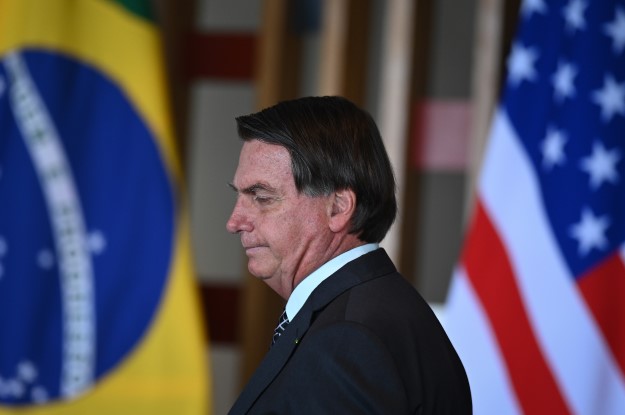SÃO PAULO – When U.S. President-elect Joe Biden suggested, during a presidential debate in September, that the U.S. offer Brazil $20 billion to end deforestation in the Amazon, he mentioned unspecified economic consequences if President Jair Bolsonaro refused. Bolsonaro reacted angrily, replying in an all-caps tweet that “OUR SOVEREIGNTY IS NON NEGOTIABLE,” and that Brazil would not accept “bribes” or “baseless threats.”
Bolsonaro’s frantic reaction was unsurprising. Over the past two years, neither France’s more aggressive approach nor Germany’s or Norway’s decisions to suspend their payments to the Amazon Fund – Norway, the fund’s largest donor, has contributed more than a billion dollars over the past decade – have led Bolsonaro to change course. The remarkably broad alliance of environmentalists, Western governments, international fund managers who control trillions of dollars, and European companies threatening to boycott Brazilian products has not had much of an impact. Quite to the contrary: In 2020, deforestation in Brazil hit a 12-year high, with 2.7 million acres razed in the year ending last July. Fines for illegal logging, a key indicator of the government’s commitment to combat deforestation, have plunged to their lowest in twenty years.
The scenario is challenging, but there is hope that the Biden administration could coax Bolsonaro into actually reducing deforestation. Likely to aid this effort significantly is former Secretary of State John Kerry, who Biden appointed to a high-profile role as the United States’ climate czar, a new position on the National Security Council. There are at least seven ways that Kerry and the Biden administration could succeed where others haven’t.
The first, and most important, is by coordinating U.S. climate policy vis-à-vis Brazil with the European Union and other G7 members to increase leverage. Europe’s efforts floundered in part because its capacity to influence Bolsonaro was too limited in a world where neither China nor the U.S. under Trump – Brazil’s two most important trading partners – showed any interest in criticizing Bolsonaro’s project of facilitating deforestation. The broader and more coherent the global coalition against Amazon deforestation, the better the chances that Brazil’s economic elites worry enough to pressure Bolsonaro into moderate his environmental policies.
Second, the U.S. should seek to reframe the entire debate away from one of conservation coming at the cost to Brazil’s sovereignty – Bolsonaro’s line of reasoning – to one about how enhancing Brazil’s capacity to monitor the tropical rainforest strengthens its sovereignty over the Amazon. As long as the U.S. frames conservation as a form of interference in Brazil’s affairs, the politically powerful armed forces and even moderates in Brazil are likely to reluctantly side with the president. After all, from a Brazilian perspective shaped by a long-standing concern about the country’s limited capacity to secure its borders and the traumatic history of U.S. interventions in Latin America, even well-meaning comments by European or U.S. policy makers about the Amazon can often sound patronizing or threatening. In 2019, French President Emmanuel Macron’s vague language about an “international status” for the Amazon made even Brazilian environmentalists cringe and allowed Bolsonaro to strengthen his argument that environmental concerns in the rich world are little more than a smoke screen for imperialist plans to challenge Brazil’s control over the world’s largest forest.
Bolsonaro is acutely aware of this dynamic. Framing the debate as one between outside interference and protecting Brazilian sovereignty, between neocolonialist environmentalists and those interested in economic development and job creation, Bolsonaro politically benefitted from the attacks. When European leaders criticized him, he taunted Macron and Germany’s Angela Merkel, called the fires and the deforestation of parts of Brazil’s rainforest an “internal issue,” and repeatedly argued that “the Amazon belongs to Brazil.” In his typically provocative fashion, Brazil’s president reacted to diplomatic pressure from Oslo and Berlin: “Isn’t Norway that country that kills whales up there in the north pole?”, he asked. “Take that money and help Angela Merkel reforest Germany.”
Third, in exchange for measurable progress in the realm of deforestation, the United States could offer Brazil’s armed forces access to more sophisticated U.S. military equipment to monitor its long, porous borders; deepening a partnership that could also help Brazil in its fight against ever more powerful transnational crime networks.
Fourth, Kerry should engage mayors, state governors and civil society who are generally eager to deepen cooperation with international donors; and a significant part of US climate aid should go directly to them – rather than trying to induce change just at the national level.
Fifth, the U.S. government should make clear, behind closed doors, that OECD accession, Brazil’s continued status as a major non-NATO ally and any further reduction of non-tariff trade barrier is conditional on significant improvements in the realm of deforestation.
Sixth, the U.S. government should not make threats of economic consequences – like Biden did during the debate with Trump in September – unless it is willing to follow through with them. Despite growing opposition in Europe to ratification of the EU-Mercosur trade deal, Brazil’s economic elites are not convinced that foot-dragging in some European capitals vis-à-vis more trade with South America is actually related to deforestation. Rather, many think Macron was merely using the Amazon fires as an excuse to oppose an agreement he did not want in the first place, while seeking to score political points with environmentalists and farmers. While some Brazilian CEOs worry that Bolsonaro’s Amazon policies may hurt Brazil’s reputation, few expect it to make a significant impact on its economy. Particularly if the EU ends up ratifying the Mercosur trade deal, Bolsonaro will feel empowered, feeling that he called Europe’s bluff.
Following up on threats is crucial because Brazil’s president will certainly test whether Biden is bluffing. After all, reining in deforestation will be politically costly for Bolsonaro. His decision to resist international pressure is the result of a careful political calculus: facilitating deforestation was one of Bolsonaro’s key campaign promises and breaking it would probably cost him support of an important part of his electorate — illegal loggers, miners, squatters and small-scale farmers. This group is represented in Brazil’s Congress by the powerful Bancada do Boi, or “cattle caucus.” Put differently, skyrocketing deforestation in Brazil is not a matter of limited government capacity – it is the result of a political project that assures Bolsonaro’s political survival.
Finally, as much as possible of such negotiations should take place behind closed doors. Rather than inviting Bolsonaro to a Twitter slugfest like Macron did in 2019 – a sphere where Brazil’s president feels at ease – the U.S. government will be far more effective if it resorts to traditional off-line diplomacy. With Kerry, who successfully negotiated the Obama administration’s nuclear deal with Iran, Biden can look to someone with a proven track record in this arena.







